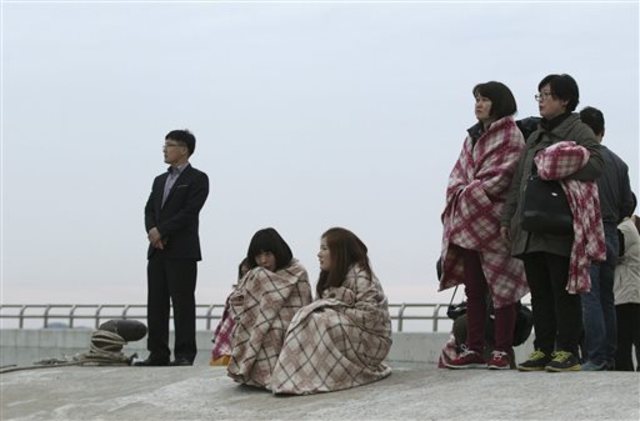South Korea Ferryboat Accident Highlights Global Mental Illness Stigma

Don’t get me wrong—I know firsthand that mental health resources, even in the 21st century, are severely lacking—but I don’t think that’s the biggest problem in this case.
SEE ALSO: 280 Missing as Ferry Sinks Off Coast Of S. Korea
According to a CNN article written by contributor Khung Lah and published three days after the accident, not a single person utilized the on-site mental health counselors at the dock. It’s easy to point fingers at the government of any country—to say that there wasn't enough aid, that appropriate measures weren’t taken—but if zero resources are utilized, it hardly matters how many are provided.
So why don’t we ask for help? The massive stigma against any kind of mental illness or even weakness that exists in our world creates a vicious, never-ending cycle. People are told to handle their own problems, but some problems are simply impossible to tackle alone. Someone with a broken leg wouldn't be told to deal with it themselves; why is grief different?
When someone has an intangible problem, society—and this is universally, not exclusive to one culture or a certain society—looks down upon them and considers them weak. People who are considered weak or looked down upon, they are far more likely to internalize their problem rather than reaching out for help. Because so few people reach out for help or put to use available resources, fewer and fewer are provided. With few resources provided and little education after tragedies, the stigma and the tendency to look down upon those who would or should ask for help is increased and, again, no one asks for help, whether it is available or not.
This problem is amplified in South Korea, a society known for its unwillingness to accept failure and exceedingly competitive nature. South Korea as a country consistently has one of the highest suicide rates in the world—the highest in the industrialized world—and the rates are something that citizens have simply accepted, accoring to this Salon article. Tragedies like the ferryboat accident certainly don’t help, but aren’t the major cause either. In the last four decades, the suicide rate worldwide has increased by 60 percent—due both to the increasing stigma against mental illness and weakness and to the increasing performance pressure of our society. The suicide rate is high and the attempted suicide rate is over 20 times higher than that and yet, people with problems that aren’t visible are pushed to the side or labeled for their “weakness”.
SEE ALSO: South Korea's President: Ferry Crew's Actions 'Akin To Murder'
In South Korea especially, “shame carries a heavy burden”, says Lah, and suicide is a widely accepted part of life, with upwards of 40 Koreans offing themselves nearly every day. The country—which has an indelibly low minimum wage despite its evolving sophistication—has recently developed rapidly, which has left an especially large crack that the poor and disabled populations slip through even more often. The suicide rate among these citizens is higher than ever. South Korea’s emphasis on success, which is usually measured monetarily, makes it a highly stressful environment to live in and discredits people even more quickly upon their failures. Failure in business is unacceptable, so admitting personal failure or asking for help is inexcusable and disgraceful.
The situation in South Korea is an obviously amplified example of the problem that exists throughout the world, but it raises many valid concerns. Why does the problem exist? Millions of people have, at any given time, been diagnosed with depression or other mental illness and millions more are suffering in silence: it’s not an uncommon enigma. A mental illness is merely an intangible example of a bodily malfunction, yet while we have no problem recognizing or treating the tangible ones, we have such great difficulty admitting to and treating the intangible ones.
Around the world, millions—maybe even billions—of people suffer every day from these problems that cannot be seen or qualified. Problems of grief, anger, denial and sadness are so easily pushed aside, considered weaknesses. Human beings are unable to live life normally because of their problems and unable to get help for their problems because of the opprobrium projected onto them by society when any kind of weakness or vulnerability arises and the entire global population is in a continuous downward spiral when it comes to this very problem. The stigma surrounding such issues is unwarranted and unacceptable, but it isn’t going to change unless higher governmental powers step in to educate people and to offer support to those suffering in attempts to reduce the ignominy.
How many more tragedies like the ferryboat accident in South Korea or the downing of MH370 will it take to demonstrate the gravity of grief and mental pain? The international community must step in and take measures to reduce the bad reputation that has come to be associated with problems of the mind. This is not just a problem in America or in South Korea; it is a global epidemic that must be addressed internationally from a societal standpoint, not merely a provider standpoint.
Reach Contributor Ariana Shives here.



